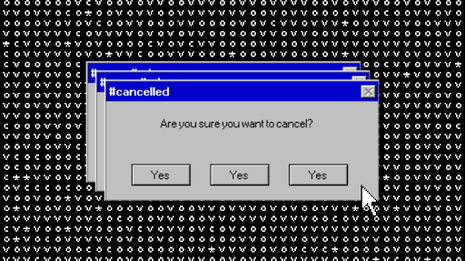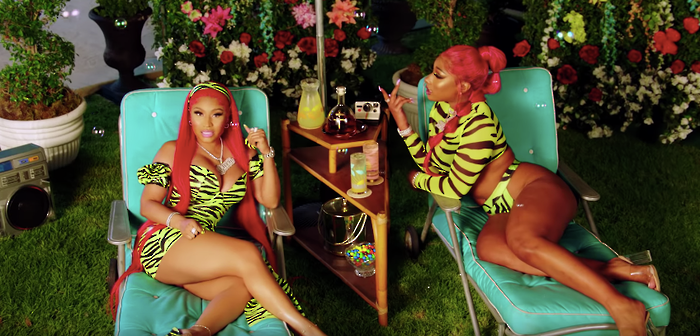On the anti-Blackness that underpins the “Cancel Culture” row
Chiedza Matsvai reflects on the inextricable links between cancel culture and the Black roots it has been appropriated from.
Done. Over. Scrapped. Obliterated. Deleted. Cancelledt.

Last month Margaret Atwood, Noam Chomsky and 150 other public figures signed an open letter, effectively urging us to cancel “cancel culture”. The letter expressed fears about how our volatile social and political times are becoming privy to “ideological conformity”, warning, “resistance must not be allowed to harden into its own brand of dogma or coercion”. Author J.K. Rowling is amongst the endorsers of the statement. At the same time, she continues to face backlash over her transphobic tweets (yeah, she’s 100% #cancelled). Rowling’s access to large public platforms to display her “views”, despite being “cancelled”, in itself undermines her position.
“Cancel culture” is not a new phenomenon (just read the Bible!). “Cancelling” means divesting your time, energy or resources from something or somebody. A public figure or entity can be #cancelled for doing or stating something in a way that is considered problematic by people, usually online. Even things get “cancelled”. I’ve officially #cancelled 2020, because have you seen this year’s news cycle!?
“While the critics of so-called “cancel culture” protect the freedom to say offensive things and maintain positions of power, another kind of censorship unfolds.”
“Cancelling” presents itself as a tool that gives a voice to the voiceless. Its present-day roots lie within Black culture, resembling the civil rights boycotts of the 1950s and 1960s. Lisa Nakamura, a Professor studying race in digital media at the University of Michigan, labels it a “cultural boycott”. In the era of the influencer and notes app apologia, it is clear that the intersection between justice and social media is increasingly convoluted. For the disenfranchised, formal institutional channels of justice are insufficient. “Cancelling” is an alternative that enables masses of marginalised young people to use their voices on the internet to reject the status quo and enact justice.
In its contemporary journey, the phrase “you’re cancelled!” was propelled to infamy in December 2014 through VH1’s reality TV show Love and Hip-Hop: New York. “Cancelled!?” exclaims Diamond Strawberry, taken aback after Cisco Rosado throws the phrase at her during their heated discussion. Slang from marginalised groups frequently enters the mainstream. “YAASS (Queen)”, “spilling the T(ea)”, and “Slay” are terms popularised by Black (LGBTQ) culture and have undertaken this process. The jocular yet sharp expression began being disseminated widely by “Black Twitter”, the powerhouse behind much of popular social media culture, from around 2015.
I’ve witnessed #cancelled evolve from a casual quip to a reaction against public figures or entities’ offensive actions or words. “Stan Twitter”, where fans battle to sanctify their #fave, transported #cancelled to the broader gaze of the internet. #[Insert celebrity name here]IsOverParty trends almost weekly as stans seek to expose rival celebrities, calling for their cancellation. As #cancelled has taken on more fluid uses, the term has become successfully co-opted by mainstream culture. “Cancel culture” is now a catch-all phrase that encompasses everything from genuine criticism to outright online harassment of public figures.
“Black culture exists as a resource to be mined by popular culture, yet Black people remain oppressed.”
#Cancelled is now labelled one of the most destructive buzzwords of the new decade. Even though opting to disengage my time, energy or resources from somebody or thing is a reasonable response to prejudice and intolerance, “cancelling” is stigmatised. People bemoan “cancel culture”, “political correctness” and “wokeness” as infringements on freedom of thought and speech. Even former President Barack Obama has bought into these arguments, reprimanding ‘wokeness’ and ‘cancel culture’ by arguing the practices aren’t activism. Yet, the form in which critics understand “cancel culture” doesn’t exist.
The demonisation of “cancel culture”, much like the ongoing war against “wokeness”, is underpinned by anti-Blackness. BVE (Black Vernacular English) is a repudiation of the white-dominated mainstream and its cultural norms. Because of the democratising nature of social media platforms like Twitter, the propagation of language and culture beyond its original contexts is inevitable. But, curiously, BVE repeatedly falls victim to an insidious process of appropriation by the white-dominated mainstream. Black culture exists as a resource to be mined by popular culture, yet Black people remain oppressed. Using “cancel culture” as a pejorative, divorced from its Black cultural contexts, inadvertently consolidates this relentless succession of hijacking and erasure.
Criticism of “cancel culture” also indicates how the white-dominated mainstream perceives Blackness as aggression. “Cancel culture”, re-coded as unmitigated hostility, springs from racist caricatures of Blackness. The phrase trivialises and discredits righteous social and political anger, criticism, and calls for accountability. People raising legitimate concerns are gaslit, accused of contributing to everything “toxic” about “cancel culture”. Rather than interrogating what prejudices people are responding to, the current panic illustrates worry about marginalised groups increasingly having viable opportunities to express their opinions. While the critics of so-called “cancel culture” protect the freedom to say offensive things and maintain positions of power, another kind of censorship unfolds.
We must re-focus discourse on examining the agile and demanding nature of white supremacy and capitalism. As noted in the open letter: “Powerful protests for racial and social justice... [and] wider calls for greater equality and inclusion across our society, not least in higher education, journalism, philanthropy, and the arts”, are currently occurring. Unfortunately, the ‘cancel culture’ row is simply a distraction, stifling the earnest and progressive dialogues happening in and around social and political justice.
 News / Cambridge academics sign open letter criticising research funding changes22 February 2026
News / Cambridge academics sign open letter criticising research funding changes22 February 2026 News / Student and union protesters hold ‘Trans Liberation Solidarity Rally’ 24 February 2026
News / Student and union protesters hold ‘Trans Liberation Solidarity Rally’ 24 February 2026 News / Union speakers condemn ‘hateful’ Katie Hopkins speech14 February 2026
News / Union speakers condemn ‘hateful’ Katie Hopkins speech14 February 2026 Features / Beyond the porters’ lodge: is life better outside college?24 February 2026
Features / Beyond the porters’ lodge: is life better outside college?24 February 2026 Fashion / The evolution of the academic gown24 February 2026
Fashion / The evolution of the academic gown24 February 2026








